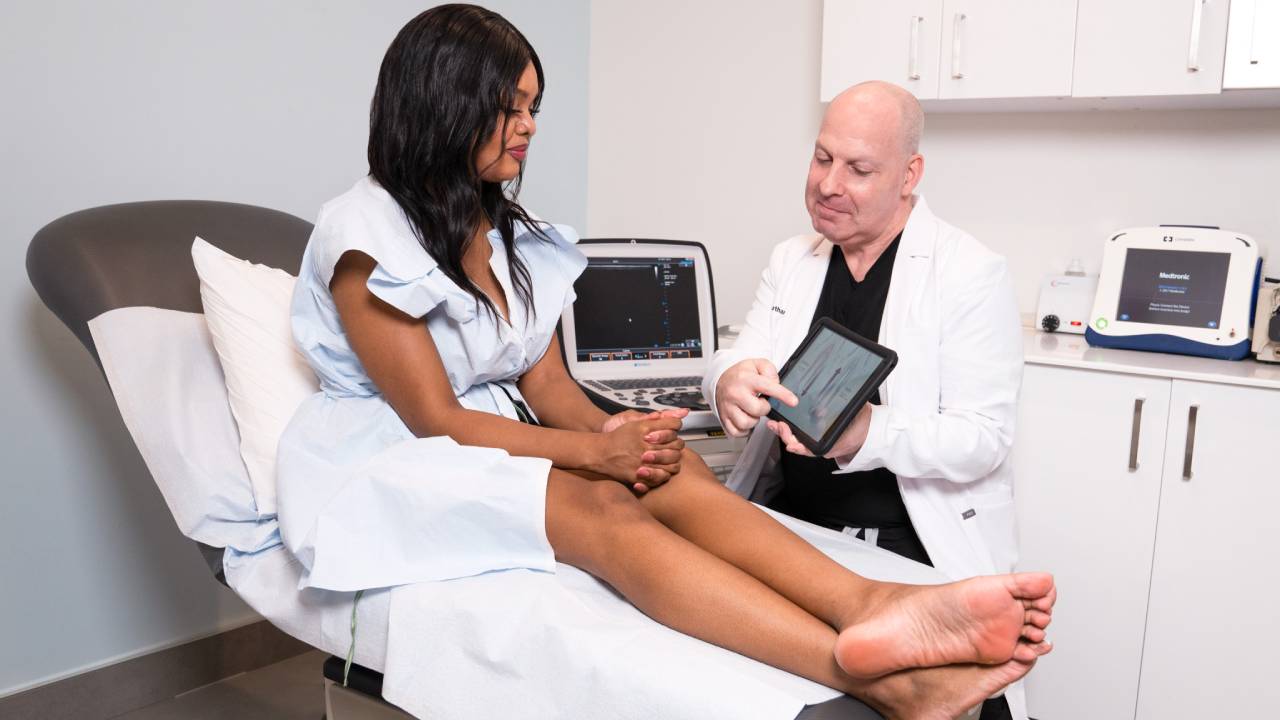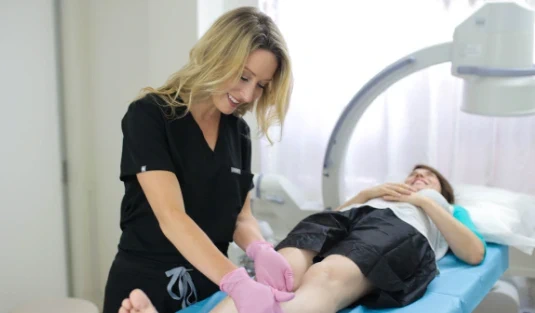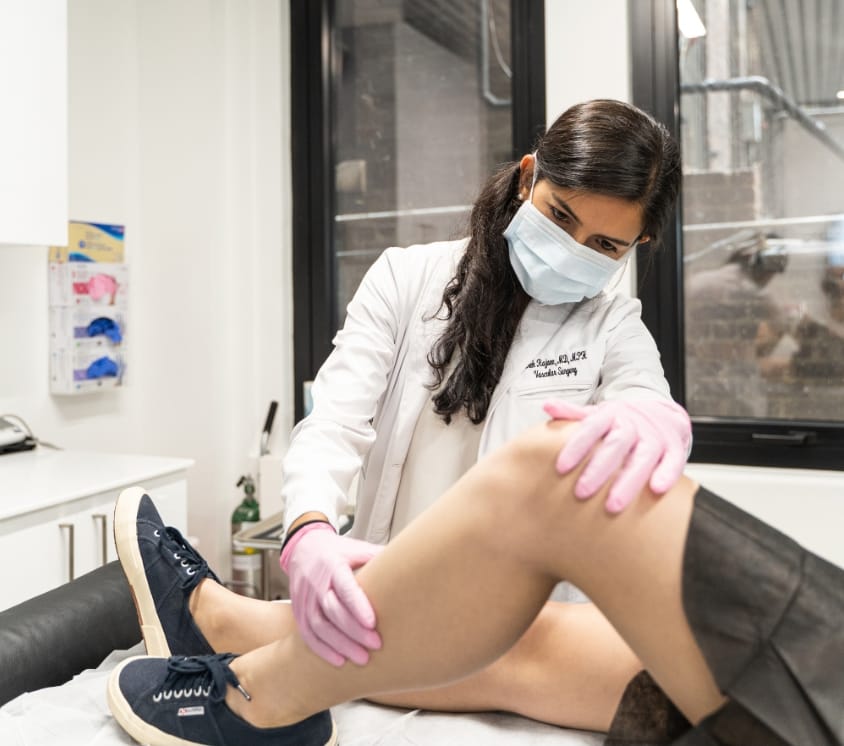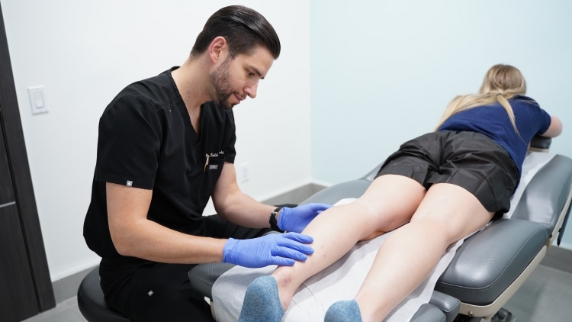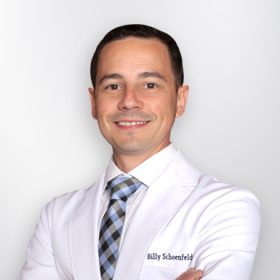You’re going about your day when you notice your legs feeling unusually heavy and tired. Then, upon closer inspection, you see twisted, bulging veins just below the surface of your skin. You’ve seen these before, but they’re becoming more painful and prominent. Varicose veins aren’t just a cosmetic issue—they can lead to significant discomfort and medical complications if left untreated.
At Vein Treatment Clinic, our vein doctors are specialists in diagnosing and treating varicose veins and related vein conditions. With state-of-the-art clinics located across the U.S., including New York, Long Island, California, Maryland, and New Jersey, we offer personalized care to help you achieve relief from varicose veins and restore your leg health. In this article, you’ll learn more about what makes our vein doctors the best choice for treating your veins.
Why You Should See a Vein Specialist for Varicose Veins
Varicose veins are more than a cosmetic issue. They often indicate an underlying condition known as venous insufficiency, where your veins fail to circulate blood back to the heart efficiently. Over time, this condition can lead to painful symptoms such as swelling, heaviness, throbbing, and cramping in your legs. If left untreated, venous insufficiency can even lead to complications like leg ulcers or blood clots.
Seeking professional care from a vein doctor is crucial for diagnosing the root cause of your varicose veins and determining the best course of treatment. At Vein Treatment Clinic, our board-certified vein specialists use advanced diagnostic tools, such as duplex ultrasound, to evaluate the extent of your condition and recommend treatments tailored to your unique needs. Contact us to schedule a consultation and take the first step toward healthier veins.
Meet Our Highly Trained Vein Doctors
The vein doctors at Vein Treatment Clinic are recognized experts in vein care. All of our vein specialists are board-certified by the American Board of Venous and Lymphatic Medicine, ensuring they have met the highest standards in diagnosing and treating vein diseases. Many of our vein doctors have trained at Ivy League institutions and have completed residencies and fellowships in vascular care, minimally invasive vein treatments, and interventional procedures.
Our vein doctors have years of experience performing the latest minimally invasive vein treatments, such as sclerotherapy, endovenous laser ablation, radiofrequency ablation, and VenaSeal. These vein treatments target the source of venous insufficiency, effectively treating both varicose and spider veins. Whether you’re dealing with large, painful varicose veins or tiny spider veins on your legs, our vein doctors have the expertise to develop a personalized vein treatment plan for you.
A Patient-Centered Approach to Vein Care
At Vein Treatment Clinic, our vein doctors understand that every patient is unique. That’s why we take a patient-centered approach to care. From your initial consultation to your final follow-up, our vein doctors are dedicated to making sure you feel comfortable and informed throughout the process. Our vein specialists take the time to explain each step of your treatment, ensuring that you have a clear understanding of your options and expected outcomes.
We know that vein issues can affect your quality of life, which is why our vein doctors are committed to helping you find relief as quickly as possible. Many of our minimally invasive vein treatments are performed in-office, requiring no general anesthesia and minimal downtime. You can return to your regular activities the same day in most cases.
If you’re experiencing symptoms of venous insufficiency or want to learn more about your vein treatment options, contact us to request insurance verification and schedule your consultation with one of our top vein doctors.
Cutting-Edge, Minimally Invasive Vein Treatments
At Vein Treatment Clinic, we pride ourselves on staying at the forefront of vein treatment technology. Our vein doctors use the latest, evidence-based procedures to ensure you receive the most effective care possible. Some of the most popular vein treatments we offer include:
- Sclerotherapy: A minimally invasive spider vein treatment where a solution is injected into the affected spider veins, causing them to collapse and eventually fade away. This is particularly effective for spider veins and small varicose veins.
- Endovenous Laser Ablation (EVLA) and Radiofrequency Ablation (RFA): These vein ablation procedures use heat to close off varicose veins, rerouting blood to healthier veins. Both are performed using local anesthesia and require little to no recovery time.
- VenaSeal: A cutting-edge vein treatment that uses a medical adhesive to seal off diseased veins. It is quick, painless, and doesn’t require compression stockings post-treatment.
- Ambulatory Phlebectomy: This procedure is used to remove larger varicose veins through tiny incisions in the skin. It’s a safe, minimally invasive varicose vein treatment for patients with significant vein bulging.
These vein treatments target the root cause of varicose veins, spider veins, and venous insufficiency, offering long-term relief and improved cosmetic appearance. Learn about our vein treatments to explore which option may be right for you.
Insurance Coverage for Vein Treatments
One of the most common concerns patients have is whether their vein treatments will be covered by insurance. The good news is that most treatments for varicose veins and venous insufficiency are considered medically necessary and are typically covered by insurance. This includes procedures like vein ablation to address the root cause of your condition.
While spider veins are often viewed as a cosmetic issue, if they’re linked to an underlying condition like venous insufficiency, your spine vein treatment may still be covered. For example, if you’re diagnosed with venous insufficiency, the sclerotherapy used to treat your spider veins could be eligible for coverage. Contact us to request insurance verification, and we’ll help you navigate your insurance options before your first appointment.
Convenient Locations Across the U.S.
At Vein Treatment Clinic, we understand that convenience matters when seeking medical care. That’s why we have state-of-the-art vein clinics across the country, with locations in New York, Long Island, New Jersey, California, and Maryland. Whether you’re looking for spider vein removal or comprehensive treatment for varicose veins, our vein clinics provide the latest technologies and treatments in vein care.
Our team is committed to delivering personalized, high-quality care at every location. No matter where you are, you can expect the same standard of excellence from our experienced vein doctors. Contact us to schedule a consultation and take the first step toward healthier, more beautiful legs with the help of our expert vein doctors at Vein Treatment Clinic.








